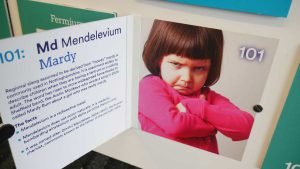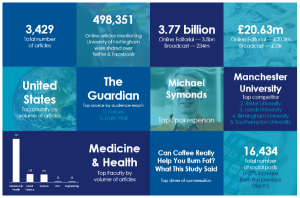
August 5, 2019, by Liz Goodwin
University News Review — June 2019
June 2019 saw lots of University of Nottingham news stories hit the headlines…
Could coffee be the secret to fighting obesity?
 Scientists from the University of Nottingham have discovered that drinking a cup of coffee can stimulate ‘brown fat,’ the body’s own fat-fighting defences, which could be the key to tackling obesity and diabetes.
Scientists from the University of Nottingham have discovered that drinking a cup of coffee can stimulate ‘brown fat,’ the body’s own fat-fighting defences, which could be the key to tackling obesity and diabetes.
The story — which was reported over 1,700 times in print, online and broadcast outlets, and reached over 32 countries around the world — appeared in the Mail Online, the Independent, the Telegraph, CNN and the New York Post, to name but a few.
Media Relations Manager for Medicine and Health Sciences Charlotte Anscombe worked with Professor Michael Symonds from the School of Medicine, to bring attention to the pioneering study, which was first published in the journal Scientific Reports.
The study is one of the first to be carried out in humans to find components which could have a direct effect on ‘brown fat’ functions, an important part of the human body which plays a key role in how quickly we can burn calories as energy.
“This is the first study in humans to show that something like a cup of coffee can have a direct effect on our brown fat functions. The potential implications of our results are pretty big, as obesity is a major health concern for society and we also have a growing diabetes epidemic and brown fat could potentially be part of the solution in tackling them,” said Professor Michael Symonds.
The Periodic Table of Nottingham
Did you know that there were Cheese Riots in Nottingham in 1766 over the price of food? Or that Queen Isabella of France sought refuge in Nottingham Castle in 1330 following a coup d’état staged by her son King Edward III?
These were just some of the fascinating facts, revealed in the first-ever Nottingham Periodic Table, which was unveiled at the University’s Wonder event, held on 15th June.
ITV News reported on the story that the University had created its very own Nottingham version to mark the 150th anniversary year of the Periodic Table, featuring local landmarks, people, facts and sayings, chosen from hundreds of suggestions made by people over the last few months.
Celebrating The Year of the Periodic Table was a theme throughout Wonder with the free fun day featuring a range of activities with a link to the elements. Visitors spent the day discovering more about the periodic table and took part in activities ranging from art workshops through to science experiments.
Jane Icke, Media Relations Manager for Science, worked with Sir Martyn Poliakoff and his team to promote the many celebrations and publicity surrounding the Nottingham Periodic Table. The idea was sparked by Sir Martyn who suggested that the 150th anniversary might be a good opportunity for a global celebration of chemistry.
He said: “The idea caught people’s imagination and a bottom-up push was enough to ignite widespread enthusiasm and, with much effort from a number of people, the idea became a reality.”
(Inclusions from the Nottingham Periodic Table)
Dementia risk with commonly-prescribed drugs
New research from the University suggests that regular use of certain types of commonly-prescribed drugs used to treat bladder conditions, Parkinson’s disease and depression, could significantly increase the risk of dementia in later life.
The study, which was picked up by the Times, the Telegraph, Mail Online, the Sun, and internationally in the New York Post, Forbes and the Indian Express, found that there was nearly a 50 per cent increased risk of dementia among patients aged 55 and over, who had used strong anticholinergic medication daily for three years or more.
Anticholinergic drugs help to contract and relax muscles, and doctors prescribe the drugs to treat a variety of conditions, including chronic obstructive pulmonary disease, bladder conditions, gastrointestinal disorders and symptoms of Parkinson’s disease.
Charlotte Anscombe, Media Relations Manager for Medicine and Health Sciences, promoted the story, working with Professor Carol Coupland from the Division of Primary Care who led the study, and Professor Tom Dening Head of the Centre for Dementia at the University of Nottingham and a member of the research study team.
Professor Coupland said: “The risks of this type of medication should be carefully considered by healthcare professionals alongside the benefits when the drugs are prescribed and alternative treatments should be considered where possible, such as other types of antidepressants or alternative types of treatment for bladder conditions. These findings also highlight the importance of carrying out regular medication reviews.”
007 is a powerful recruitment brand for MI6
 Sean Connery, George Lazenby, Roger Moore, Timothy Dalton, Pierce Brosnan or Daniel Craig…. who is your favourite James Bond? 007’s impact on UK popular culture is immeasurable, with these actor’s making life as Bond — licence to kill, fast cars, gadgets and encounters with beautiful women — look so appealing. So much in fact, that Ian Fleming’s character still plays an integral role in MI6 recruitment, even though his work bears little to no resemblance to the work of a real spy.
Sean Connery, George Lazenby, Roger Moore, Timothy Dalton, Pierce Brosnan or Daniel Craig…. who is your favourite James Bond? 007’s impact on UK popular culture is immeasurable, with these actor’s making life as Bond — licence to kill, fast cars, gadgets and encounters with beautiful women — look so appealing. So much in fact, that Ian Fleming’s character still plays an integral role in MI6 recruitment, even though his work bears little to no resemblance to the work of a real spy.
Dr Rory Cormac, Associate Professor of International Relations in the University’s Faculty of Social Sciences, specialises in secret intelligence. Speaking at the Hay Festival of Literature and Arts in Wales, Dr Cormac revealed that 007 is a powerful brand for the Secret Service.
The Guardian, the Express and Yahoo! Movies, all reported on the story in which Dr Cormac revealed that MI6 like the image it creates: “As Bond is linked to British omnipotence and omniscience. It is a great recruitment sergeant as well — although a lot of people who want to become James Bond get weeded out very early as they are psychopaths.”
In fact, Dr Cormac even revealed that intelligence officials from other countries sometimes use the legendary character as an ice-breaker when they come to face to face with MI6 agents.
€2m to boost cyber power behind wind energy production
Researchers at the University of Nottingham are leading a €2m effort to use High Performance Computing (HPC) to optimise the sustainable exploitation of wind power.
The Engineer reported on the story that the two-year project will involve 12 partners from across Europe and Brazil.
Annual energy production by wind turbines reached around 10.4 per cent in the EU by the end of 2016. Brazil, meanwhile, has the ninth largest wind capacity in the world and is experiencing more than 10 per cent annual growth with nearly 500 wind farms already deployed.
Katie Andrews, Media Relations Manager for Engineering, worked with project lead Dr Xuerui Mao, to promote the story. Dr Mao said: “At almost every stage in wind energy exploitation ranging from wind turbine design, wind resource assessment and power prediction to wind farm layout and operations, the application of HPC is a must.”
And finally…
 If you haven’t watched Love Island this summer, you must at least have heard the furore surrounding the ITV2 reality show, where young couples unite looking for a summer of romance and love.
If you haven’t watched Love Island this summer, you must at least have heard the furore surrounding the ITV2 reality show, where young couples unite looking for a summer of romance and love.
New research from the University of Nottingham has found that programmes like Love Island, along with TOWIE and Geordie Shore, have exposed children and young people to smoking and alcohol, partly because the shows are available on catch-up outside the 9pm watershed.
The Independent, the Guardian and the Daily Mail all reported on the study by researchers from the University’s Centre for Tobacco and Alcohol Studies, that measured depictions of alcohol and tobacco products, claiming it encouraged young people to smoke or drink underage by bombarding them with images of drink and cigarettes.
Lead researcher Dr Alexander Barker who appeared on BBC1 East Midlands Today to discuss his findings, said: “Given that seeing alcohol or tobacco imagery in the media promotes use among young people, our study therefore identifies reality television shows as a major potential driver of alcohol and tobacco consumption in young people in the UK.”
The stats
June 2019
No comments yet, fill out a comment to be the first




Leave a Reply